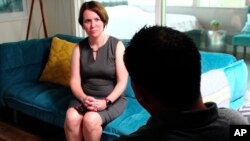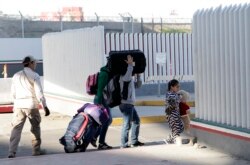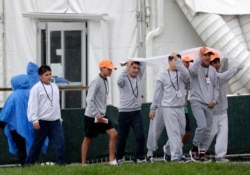This story is part of an ongoing joint investigation between The Associated Press and the PBS series Frontline on the treatment of migrant children.
WASHINGTON — Dozens of families separated at the border as part of the Trump administration's zero tolerance policy are preparing to sue the federal government, including several who say their young children were sexually, physically or emotionally abused in federally funded foster care.
A review of 38 legal claims obtained by The Associated Press — some of which have never been made public — shows taxpayers could be on the hook for more than $200 million in damages. More than 3,000 migrant children were taken from their parents at the border in recent years and many more lawsuits are expected, potentially totaling in the billions.
The families — some in the U.S., others already deported to Central America — are represented by grass-roots immigration clinics and nonprofit groups, along with some of the country's most powerful law firms. They're making claims under the Federal Tort Claims Act as a precursor to filing lawsuits. The FTCA allows individuals who suffer harm as a direct result of federal employees to sue the government.
``It's the tip of the iceberg,'' said Erik Walsh, an attorney at Arnold & Porter, which has one of the world's leading pro bono programs.
18 claims so far by firm
The firm has so far filed 18 claims on behalf of nine families, totaling $54 million, and Walsh says dozens more are likely.
The government has six months to settle FTCA claims from the time they're filed. After that, the claimants are free to file federal lawsuits.
The departments of Justice and Homeland Security, both named in the claims, did not respond to requests for comment.
Health and Human Services, the agency responsible for the care of migrant children, said it couldn't comment on pending litigation, but that it treats children with dignity and respect.
Last year, HHS's Office of Refugee Resettlement cared for nearly 50,000 children who crossed the border by themselves, as well as children who were separated from their families under the zero-tolerance policy.
The agency housed them in foster programs, residential shelters and detention camps around the country, sometimes making daily placements of as many as 500 new arrivals, from babies to teens.
The allegations of abuse and assaults in foster care raise fresh questions about the government's efforts to place younger children with families in lieu of larger shelters and packed detention facilities.
Emotional, physical harm
The legal claims, a recent federal court filing and HHS documents released by Congress earlier this year allege that children have suffered serious emotional trauma after being physically harmed or fondled by other children while in foster care.
Six of the claims for damages involve children who were in foster care. And one recent court filing refers to a migrant child being abused in foster care.
The records released by Congress show the Office of Refugee Resettlement referred at least seven foster care allegations of sexual abuse to the Justice Department in 2017 and 2018. Because some are anonymous to protect the children's privacy, it's unclear if some of the claims are duplicates.
Justice has not responded to repeated queries about those cases from members of Congress.
Three of the four incidents involving physical harm outlined in the FTCA claims occurred at Cayuga Centers in New York, the largest foster care placement for migrant children, housing up to 900 babies and children at a time.
Cayuga Centers did not respond to requests for comment.
One Guatemalan mother whose 5-year-old daughter was placed in Cayuga last year says her little girl still wakes up crying from what she endured at the foster home.
``Now she's scared each time we go out or when she sees a police car or someone in uniform,'' said the mother, who has filed a $6 million claim. ``She says `Mami, don't let them separate us again.' ''
Families who spoke to the AP and Frontline did so on the condition of anonymity over fears about their safety.
New York program
Another 5-year-old Guatemalan girl said a boy grabbed her chest and touched her inappropriately, both in her foster home and during daytime classes at a Safe Haven for Children New York foster program, according to a $3 million injury claim. The girl was moved to a new foster home but suffered verbal abuse from her foster parent's mother, who called her names and locked her alone in rooms as punishment, according to the claim.
A spokesman for Lutheran Social Services of New York, which oversees the Safe Haven foster program, declined to comment.
Two claims blame the government for wrongful deaths: one, seeking $20 million, was filed by the wife of a Honduran father who killed himself in a padded cell after officers pulled his 3-year-old son from his arms.
``The people making these policies intended this level of suffering, and that's what's unconscionable,'' said John Escamilla, who is representing the man's wife and two children.
He said he planned to file a federal lawsuit stemming from his FTCA claim soon.
The government has not settled any family separation cases in the administrative claims stage. But one federal lawsuit is currently in litigation in Massachusetts, and in February, a judge approved a $125,000 settlement for a Honduran mom and her son, then 6, who had been detained for four months and threatened with separation under the Obama administration.
Aseem Mehta, a law student at the Jerome N. Frank Legal Services Organization at Yale Law School who worked on the case, said the settlement, the first of its kind, sends a clear message that such claims have legal standing.
'These claims are viable'
``Our case is a benchmark,'' Mehta said. ``The most important takeaway is these claims are viable, and courts will entertain them, and the Department of Homeland Security views them as meritorious; they don't settle cases unless they think there's liability they're exposed to.''
Janet Napolitano, who led Homeland Security from 2009 to 2013, said she recalled a number of tort claims were filed against the agency in her time but said family separations were rare. The Trump administration's failure to swiftly reunify families and children may have left the agency open to lawsuits, she added.
``There very well may be some vulnerability there,'' said Napolitano, now the president of the University of California.


